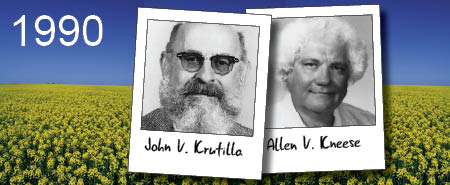Pioneers during a time when nobody worried about the cost
Alan Kneese and John Krutilla began their work in the fifties during a period of strong economic growth when few others took notice of the environmental effects. Krutilla and Kneese established Resource and Environmental Economics as a respectable and understandable research discipline. They were the first to combine economics and ecology and made a systematic analysis of different aspects of environmental effects in relation to the current economic system. Their research laid down the principles of management and in doing so they established a foundation on which a large number of today’s researchers have based their work.
The Prize Jury’s Citation:
Professor Krutilla and Professor Kneese were pioneers in developing the theory of environmental economics and in demonstrating how the theory can be applied to influence public policy decisions on various concrete issues. Their work laid the foundation for a growing body of research on and knowledge about the complex relationship between the environment and the economy.
Professor John V. Krutilla , (1922–2003)
“The founding father of the modern theory of resource conservation”
John V Krutilla was one of the designers of cost benefit analysis and its use for public investment projects. He developed the existing theory of investment to incorporate external consequences. His research led to the extensions of the principles of public investment theory to the conservation of wild and endangered species, wild lands, river and scenic resources.
From 1955 until retiring in 1988, Dr. Krutilla was a staff economist with Resources for the Future, a Washington-based think tank. During that period, his research played a key role in the development of economic analyses of the value of natural resources and was a major influence on the public dialogue concerning environmental issues.
Krutilla’s work has then been important for a number of laws in the United States such as: The Natural Environmental Policy Act, the Endangered Species Act, the Compensation and Liability Act.
Most known for:
The impact of Krutilla’s theories on environmental preservation and economics can hardly be overstated. With the publication of his landmark research paper, “Conservation Reconsidered” (American Economic Review, Vol. 67, 1967), Krutilla laid the intellectual cornerstone of what today is an international discipline that is central to the assessment and protection of the environment. Over the course of his career, he fundamentally altered the global debate regarding comparisons and choices—both private and public— about the varied uses for undisturbed wild rivers, species, and other natural resources.” Resourses Magazine
Research Stipend
Resources for the Future (RFF) will award one research grant for the 2008-2009 academic year in honor of the late John V. Krutilla who served as a senior fellow at RFF for most of his career.
http://www.rff.org/About_RFF/Pages/JohnVKrutillaResearchStipend.aspx
——————————————————
Professor Allen Kneese
 Working in parallel, Allan Kneese has equally impressive research accomplishments concerning the quality dimensions of environmental resources. His work focused on the interaction between the physical characteristics of production technologies and the generation of pollutants leading to environmental externalities. Kneese concentrated his research on management problems for water resources, while Krutilla’s focus is on investment.
Working in parallel, Allan Kneese has equally impressive research accomplishments concerning the quality dimensions of environmental resources. His work focused on the interaction between the physical characteristics of production technologies and the generation of pollutants leading to environmental externalities. Kneese concentrated his research on management problems for water resources, while Krutilla’s focus is on investment.
Most known for:
Allen was the first to integrate in a truly meaningful way in environmental analysis the physical, natural, and social sciences, anticipating by at least 25 years the development of ecological economics.
Kneese’s path-breaking book, The Economics of Regional Water Quality Management, from 1964, documented for the first time the interaction between economic and physical considerations in managing the effluent loads of a water system.
“Allen collaborated with physicists, lawyers, philosophers, engineers, and sociologists. By doing so, he was able to enrich environmental economics beyond what it would have otherwise been.”26 RESOURCES SPRING 2001 / ISSU E143
—————————————————
Environmental and Resource economics
Environmental and Resource economics is a research discipline that lays a foundation for analyzing economic activities with external consequences. This field covers different approaches such as:
a) How to measure and evaluate consequences that are external to the economic system?
b) Is it possible and desirable to set prices on these activities in order to let a market make a trade-off between economic and non-economic consequences?
c) How should programs for environmental protection be analyzed and formulated from an economic point of view?
More about Resource and environmental economics:
Association of Environmental and Resource Economists (AERE)
http://www.eaere.org/index.html
————————————————
Resources for the Future (RFF)
RFF is a nonprofit and nonpartisan organization that conducts independent research – rooted primarily in economics and other social sciences – on environmental, energy, natural resource and public health issues.
http://www.rff.org/
Tags: ecology, economy, Environment, Environmental Economics, Kneese, Krutilla, Resource, Sustainable Development, Volvo Environment Prize, Winner


October 23, 2009 at 22:58 |
Excellent article, bookmarked for future referrence
March 29, 2010 at 15:46 |
My name is Piter Jankovich. oOnly want to tell, that your blog is really cool
And want to ask you: is this blog your hobby?
P.S. Sorry for my bad english